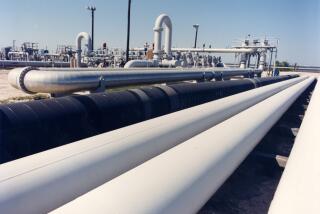Oil Prices Ease on Plan to Tap Reserves
- Share via
LONDON — Oil prices fell Monday, extending Friday’s sharp drop, after the release by industrialized nations of emergency stocks to prevent a U.S. fuel crisis after Hurricane Katrina.
Worries about U.S. consumer confidence and Katrina’s effect on economic growth and fuel demand also undermined the oil market.
London Brent crude closed down $1.22 at $64.84, close to levels seen before Katrina disrupted U.S. Gulf oil production and refining operations. U.S. crude, not traded on Labor Day, finished at $67.57 a barrel Friday after peaking a week ago at a record $70.85.
“Literally and figuratively, I think we’ve weathered the storm, as the release of strategic reserves has calmed the market,” said David Thurtell, commodity strategist at the Commonwealth Bank of Australia.
The International Energy Agency on Friday announced that its 26 industrialized member countries would release 2 million barrels per day of oil for 30 days. It is the first time the agency has tapped government oil stocks since the 1991 Persian Gulf crisis.
Analysts said the move could mark a change in oil market psychology. At last week’s high point, crude had risen 60% since Jan. 1.
“Governments have shown that if there is a substantial supply risk they are willing to act, and act quickly,” said Gary Ross, chief executive of U.S. consulting firm PIRA Energy.
The United States will auction off 1 million barrels per day of crude oil from national reserves while European and Asian countries focus on releasing refined products.
Oil analysts were starting to consider the potential effect of Katrina on a U.S. economy where growth is already slowing as a result of inflated energy costs.
Goldman Sachs cut its forecast for U.S. gross domestic product in the third and fourth quarters by 0.5 to 1 percentage point. That would mean a reduction of about 150,000 to 200,000 barrels per day in U.S. oil demand.
On top of that, some say high fuel retail prices may now begin to affect U.S. consumer behavior.
“You can’t have these sorts of prices without a substantial effect on demand,” Ross said.
“Both the price shock of higher energy prices and thus far isolated incidents of fuel shortages and gas lines and the emotional shock of witnessing an unprecedented disaster in modern American history could provide the trigger for a change in economic behavior,” said Washington consulting firm PFC Energy.
The U.S. oil industry is still struggling to recover from Katrina, which flooded refineries, cut power supplies to pipelines and knocked down rigs and platforms a week ago.
Only one of the eight closed refineries in Louisiana and Mississippi had restarted by Sunday evening. Two of the largest plants have suffered extensive flooding and could be down for months, the government said. A dozen more plants were running at reduced rates because of crude supply disruptions.
But with power returning to the region, pipelines were able to boost operations. The nation’s biggest refined-oil pipeline, Colonial, was expected to reach 86% of capacity over the weekend.
Crude output from the Gulf of Mexico, home to a quarter of U.S. domestic production, was running at 21% of its normal rate, up 10 percentage points since Friday.
More to Read
Inside the business of entertainment
The Wide Shot brings you news, analysis and insights on everything from streaming wars to production — and what it all means for the future.
You may occasionally receive promotional content from the Los Angeles Times.










